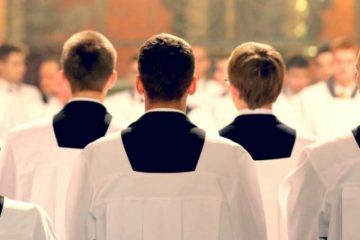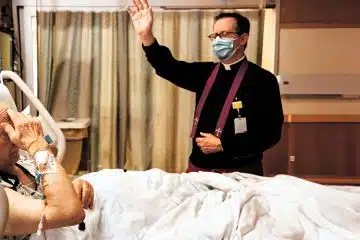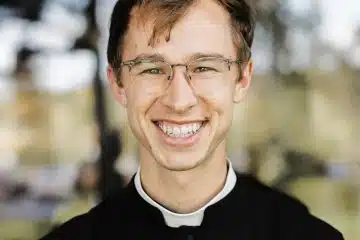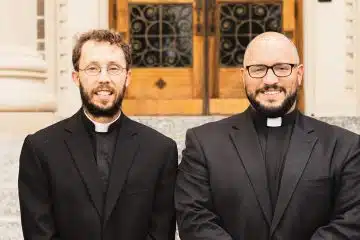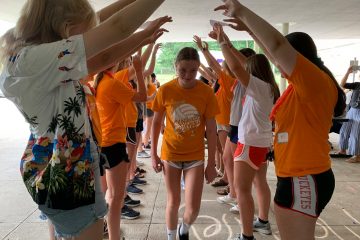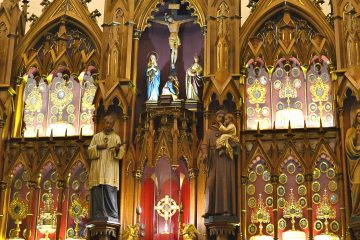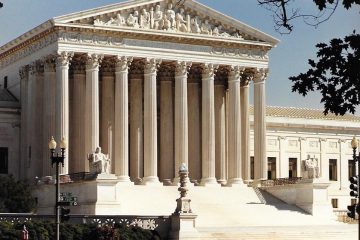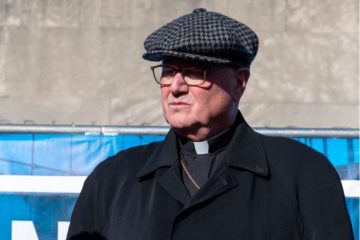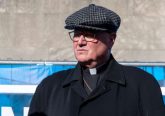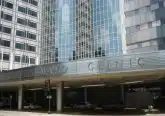New diocese, old problems: Bishop takes stock of Venezuelan see’s needs

IMAGE: CNS photo/Tyler Orsburn
By Mark Pattison
WASHINGTON (CNS) — Bishop Jose Manuel Romero Barrios spent the first anniversary of the Diocese of El Tigre, Venezuela, of which he is its founding bishop, not in the diocese but in the United States to meet with American Catholic leaders, both lay and ordained, and to meet with Venezuelans who have migrated to the U.S. — some of whom have fled their homeland’s economic and political chaos.
"One example: In the last two days, the line for gas has increased. The times have increased. One week, stop at the same spot waiting for gas," Bishop Romero said. "And this is a rich country."
Bishop Romero spoke with Catholic News Service May 30 during a visit to the U.S. Conference of Catholic Bishops. His remarks were interpreted by Father Juan Puigbo, a Venezuelan-born priest now ministering in the Diocese of Arlington, Virginia, and for whom Bishop Romero was his seminary rector in Spain.
"To his benefit, he’s a native of the area. So he knows the situation," Father Puigbo said. "He’s close enough to understand the reality of the people."
Bishop Romero cited a national consultation of Venezuelan Catholics conducted from 2000 to 2006 by the nation’s bishops that gave them the tools to deal with the country’s current situation. It was "an opportunity to get together and share the common mission of what the church should be in Venezuela," he said.
He is a member of the Venezuelan bishops’ youth and young adult commission, tasked with demonstrating "the commitment of the church to young people," Bishop Romero said. Catechesis, he added, "is now taking on a family dimension, rather than just teaching the kids for confirmation or first Communion."
El Tigre had been one of seven deaneries of the Diocese of Barcelona, Venezuela. The new diocese has about 450,000 residents, 300,000 of whom are Catholic, according to Bishop Romero, who had been a Barcelona auxiliary bishop before the El Tigre Diocese was created.
However, the new see has some catching up to do. There are just two Catholic schools, 14 parishes and one vicariate run by nuns, and only eight priests — five of them belonging to religious orders.
"El Tigre has been visited three times by the Vatican’s nuncio to Venezuela: one in 2014, before it was a diocese; last year, when the diocese was created; and then two days ago," Bishop Romero told CNS. "He said, ‘You already have people. Now you need priests!’"
El Tigre has been dependent on the oil and tourism industries. Now both are a mess.
"People work in the oil company cannot go to work because there is no gasoline. There is no water, there is no tires, there is no gas," Bishop Romero explained. "Many factories and companies have closed because they had contracts with the oil company, which is owned by the government. Then the government didn’t pay, so they had to go out of business."
Tourism has suffered "totally," the bishop added. "There is no tourism now. There is no structure to support it. With no oil, there is no transportation, there is no gas, there is no power, there is no water." Should anyone want to vacation there, "there are only four airlines flying into Caracas," the capital, Bishop Romero said.
The U.S. State Deptartment issued a new travel advisory April 9 on Venezuela. "Do not travel to Venezuela due to crime, civil unrest, poor health infrastructure, kidnapping, and arbitrary arrest and detention of U.S. citizens," it said.
The travel advisory didn’t even get into the political turmoil pitting sitting president Nicolas Maduro, who has grown unpopular among Venezelans, against U.S.-backed Juan Guaido, who declared himself acting president in January and whose late-April bid to assert power sputtered to a halt when expected military defections did not take place.
"They can’t break each other in this fight," Bishop Romero said. "It is good they find the strong leader in Guaido," whom he said "gets" the work of the bishops’ youth and young adult commission.
"The government is giving away the food every two weeks for getting people’s support of the government," Bishop Romero said. "The people are grateful for the government to feed them. This is a way for the government to control people."
But "the Chavista mold" — a reference to Maduro’s predecessor, Hugo Chavez, "is no longer in place, no longer supported by the people," Bishop Romero said.
Even if that is so, that has not stopped saber-rattling from Washington during the ongoing strife. "We don’t want a war. But there are 20,000 Cubans in active military service in Venezuela," Bishop Romero said. "We’ve also lost 4 million people from Venezuela," ticking off name after name of other countries in Latin America to which they’ve immigrated.
– – –
Follow Pattison on Twitter: @MeMarkPattison
– – –
Copyright © 2019 Catholic News Service/U.S. Conference of Catholic Bishops. www.catholicnews.com. All rights reserved. Republishing or redistributing of CNS content, including by framing or similar means without prior permission, is prohibited. You may link to stories on our public site. This copy is for your personal, non-commercial use only. To request permission for republishing or redistributing of CNS content, please contact permissions at [email protected].


